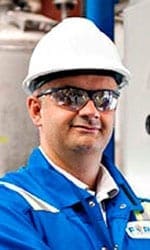Collaborating to produce greener aviation fuel
Forge Hydrocarbons, a University of Alberta spinoff company producing renewable fuels and chemicals, is collaborating with Edmonton International Airport (YEG) to work towards a new biojet fuel production facility in the Edmonton area.
A memorandum of understanding, announced during the SMART Airports & Regions Conference & Exhibition, taps into a research program involving close collaboration between YEG and the U of A to create jet fuel from biowaste, based in the Faculty of Agricultural, Life & Environmental Sciences.
 David Bressler |
 Tim Haig |
 Myron Keehn |
 Aminah Robinson Fayek |
Forge Hydrocarbons uses patented technology developed by U of A bioresource scientist David Bressler that converts waste fats and oils into hydrocarbons used to produce biofuels.
The pledge to establish a production facility will leverage Bressler’s ongoing work to develop biofuel for the aviation industry that has a lower carbon footprint than fossil fuels, and can be sustainably supplied from renewable products like restaurant grease and tallow from the rendering industry.
The facility would use “next generation” technology developed over the past four years, which has yielded new ways to upgrade the biofuel to meet stringent specifications for the aviation industry, Bressler says.
“It’s a new approach that allows us to make jet fuel without any technical hard requirements for additives or blending, and it contributes to decarbonizing a high-emission industry that doesn’t have a lot of alternatives in electrification and other spaces.”
The biofuel technology also “continues to capitalize on Alberta’s strengths of agriculture and energy,” he adds. “That supports commercial growth within the province and sustainably diversifies our energy streams.”
The new work, through partnerships with CanmetENERGY in Devon, Alta., and supported with major grants from Natural Resources Canada, Prairies Economic Development Canada, Alberta Innovates and the University of Alberta Future Energy Systems, represents the next step of innovation, building on core U of A technology already being deployed in a demonstration biofuel plant finalizing design by Forge Hydrocarbons and its partners in Sombra, Ont., that targets diesel and naphtha product lines.
Tim Haig, CEO of Forge Hydrocarbons, notes the collaboration with YEG also leverages the company’s ability to scale production plants according to regional needs using a wide range of feedstocks.
“This endeavour represents our commitment to sustainability, the environment and the future of clean fuels,” Haig says.
Myron Keehn, president and CEO of Edmonton Airports, says Forge’s unique approach to creating sustainable fuel sources “aligns with YEG’s responsibility to create a better future for our people and our planet.”
“Making smart and sustainable decisions go hand-in-hand,” Keehn says. “This partnership will showcase the power of low-emission fuel in the aviation sector, and we are excited to scale the development and commercialization of local technology here in the Edmonton Metro Region.”
The new initiative builds on a partnership between the U of A and YEG to benefit areas of mutual interest, including research commercialization and business development.
“At the University of Alberta, we take great pride in joining our community partners to accelerate the development of innovative solutions to global challenges. This spirit of collaboration is exemplified in this new partnership between Forge Hydrocarbons and the Edmonton International Airport,” says Aminah Robinson Fayek, vice president of research and innovation.
“We look forward to working together to develop the next generation of biofuels and reaching a sustainable future for the generations to come.”
| By Bev Betkowski
This article was submitted by the University of Alberta’s Folio online magazine, a Troy Media Editorial Content Provider Partner.
The opinions expressed by our columnists and contributors are theirs alone and do not inherently or expressly reflect the views of our publication.
© Troy Media
Troy Media is an editorial content provider to media outlets and its own hosted community news outlets across Canada.


